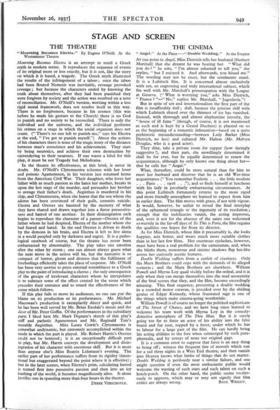STAGE AND SCREEN
THE THEATRE
Mourning Becomes Electra." By Eugene O'Neill. At the Westminster Theatre
Mourning Becomes Electra is an attempt to retell a Greek myth in modern terms. It reproduces the sequence of events of its original more or less exactly, but it is not, like the story on which it is based, a tragedy. The Greek myth illustrated the results of the infringement of a taboo ; once the taboo had been flouted Nemesis was inevitable, revenge provoked revenge ; but because the characters ended by knowing the truth about themselves, after they had been punished they were forgiven by society and the action was resolved on a note of reconciliation. Mr. O'Neill's version, working within a less rigid moral framework, does not resolve itself in this way. There is no forgiveness, because in his cosmos (this was before he made his gesture to the Church) there is no God to punish and no society to be reconciled. There is only the individual and the universe, and the individual performs his crimes on a stage in which the social organism does not count. (" There's no one left to punish me," says his Electra at the end, " I've got to punish myself.") About the actions of his characters there is none of the tragic irony of the distance between man's conscience and his achievement. They start by being neurotics, and achieve their own destruction by surrendering to their neuroses. If one wants a label for this play, it must be not Tragedy but Melodrama.
In the theatre its effectiveness, at this level, is never in doubt. Mr. O'Neill's Clytemnestra schemes with her lover and poisons Agamemnon, in his version just returned home from the American Civil War. Their daughter, who loves her father with as much passion as she hates her mother, breaks in upon the last stage of the murder, and persuades her brother to avenge their father's death. Aegisthus is murdered in his ship, and Clytemnestra, when she learns that the son whom she adores has been convinced of their guilt, commits suicide. Electra and Orestes are haunted by the memory of what they have shared and drawn together into a fierce possessive- ness and hatred of one another. In their disintegration each begins to reproduce the character of a parent—Orestes of the father whom he had despised, Electra of the mother whom she had feared and hated. In the end Orestes is driven to death by the demons in his brain, and Electra is left to live alone in a world peopled only by darkness and regret. It is a patho- logical casebook of course, but the theatre has never been embarrassed by abnormality. The play takes one emotion after the other by storm ; one can almost always guess what the next move in the action will be, but the narrative is so compact of horror, gloom and distress that the fulfilment of forebodings efficiently takes the place of suspense. Mr. O'Neill has been very unwise to press external resemblance to a Greek play to the point of introducing a chorus ; the only consequence of the groups of irrelevant characters whom he interpolates is to subtract some of the effect created by the scene which precedes their entrance and to retard the effectiveness of the scene which follows.
If this play fails to move its audiences, no one can put the blame on its production or its performance. Mr. Michael Macowan's production is exemplarily direct and quick, and he has been well served by Mr. Brian Easdale's music and the decor of Mr. Peter Goffin. Of the performances in the subsidiary parts I liked best Mr. Mark Dignam's sketch of this play's stiff and pathetic Agamemnon and Mr. Reginald Tate's mutable Aegisthus. Miss Laura Cowie's Clytemnestra is somewhat undynamic, but extremely accomplished within the mode in which the part is played. Mr. Robert Harris's Orestes could not be bettered ; it is an exceptionally difficult part to play, but Mr. Harris conveys the development and disin- tegration of his character with enormous skill. But it is more than anyone else's Miss Beatrix Lehmann's evening. The earlier part of her performance suffers from its rigidity (inten- tional but exaggerated beyond the point where it is effective) ; but in the later scenes, when Electra's prim, calculating hatred is turned first into possessive passion and then into an icy loathing of the world, it becomes magnificently alive. It alone justifies one in spending more than four hours in the theatre.
DEREK VERSCHOYLE.














































 Previous page
Previous page